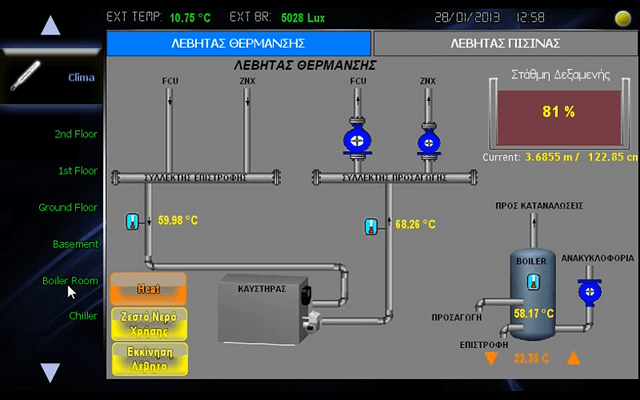Weather compensation heating controls
Weather compensation heating controls
Valuable way to improve efficiency
Weather compensation is a valuable way to improve the efficiency of all heating systems, but is especially useful when ground source heat pump system is installed.
Weather compensation works particularly well with ground source heat pump systems and improves efficiency substantially as it allows the temperature of the hot water circulating in the radiators and underfloor heating to be much lower than in a traditional system. This increases the efficiency of the heat pump (its coefficient of performance) meaning that we can achieve much quicker rates of return and lower energy bills.
Nearly all houses in Greece run on traditional, very basic heating controls. The boiler or heat source is set to run at its maximum temperature when the house thermostat demands heat input, and it switches off when the thermostat says it is warm enough. The thermostat is of course sited in just one room – not necessarily the ideal one, and the system is controlled by a simple time-clock. To compensate for deficiencies in control the radiators in most houses are substantially oversized, and normally the boiler will be more than twice the size it needs to be to meet the worst-case, steady-state heating demand of the property. The net result of this is that the system suffers greatly from overheating, the boiler will continually turn on and off (cycling), and the system will run very inefficiently and at times make the heating uncomfortable.
These problems are generally caused by the positioning of the room thermostat. It is very difficult to position it in an area of the house that suits all environments. Traditionally, we size the radiators larger in the resting areas of the house, living rooms and bedrooms. Radiators in kitchens, bathrooms, hallways and entrance halls are generally smaller to allow more wall space and not to impede access. However in many houses the heating thermostat is positioned in these areas. However people still set the thermostat so that those areas are warm and comfortable, thus overheating the other rooms.
As the cost of heating continues to rise, it is natural that people want to delay the start of the heating season for as long as possible. However waiting to heat your house until you feel cold is not the most efficient strategy. When you do turn on the heating, the system has to work hard to heat the house, and later, when it warms up, with the limited control available and the oversizing of the boiler, the boiler will continue to cycle. In both cases you are using energy inefficiently.
Weather compensated heating systems on the other hand use a small outdoor sensor to adjust the system controls to compensate for changes in outdoor temperature automatically. As the weather gets colder the system works harder and produces more heat to your radiators, and as the weather warms up the system reduces the temperature to your radiators. The system runs more consistently feeding energy into the building gradually and efficiently over a longer period of time.
The key benefits to weather compensation are:
- Energy is fed into the building gradually over a period of time using the equipment as it is designed to be used.
- The heat source will modulate and run at a lower, more efficient rate – somewhat similar to driving your car at a steady 56mph.
- The heat pump or boiler fires less often and reduces cycling which is a major cause of inefficiency and premature failure in traditional central heating systems.
- It maintains the fabric of the building at a steady consistent temperature and provides the occupants with increased levels of comfort.
- There is no need to turn off your heating system at all. The heating will come on as required by the outdoor temperature. This means that on a cool, late summer evening the heating will automatically come on to provide some heat, and on a warm spring day the heating will not switch on at all.
- Finally, and most importantly, the effect of running the system with weather compensation means a potential saving of up to 15% on your fuel bills. Add this to the fact that you will also extend the life of your heat pump or biomass boiler and create a more comfortable living environment it is something that we all should be doing.
Copyright © KtirioService 2006-2026. All Right Reserved.
Designed & developed by webgift.



